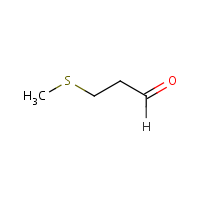3-(Methylthio)propionaldehyde
Agent Name
3-(Methylthio)propionaldehyde
Alternative Name
Methional
CAS Number
3268-49-3
Formula
C4-H8-O-S
Major Category
Other Classes

Synonyms
3-(Methylmercapto)propionaldehyde; 3-(Methylthio)propanal; 3-Methylmercaptopropyl aldehyde; Methional; Methional (natural); Methylmercaptopropionic aldehyde; Propanal, 3-(methylthio)-; Propionaldehyde, 3-(methylthio)-; beta-(Methylmercapto)propionaldehyde; beta-(Methylthio)propionaldehyde; 4-Thiapentanal; [ChemIDplus] beta-(Methylthio)propionic aldehyde; Methyl mercaptopropionaldehyde; Thia-4-pentanal; Thiapentanal; [CAMEO] MTPA; MMP; [OECD SIDS: 3-(Methylthio) propionaldehyde - 2003] 3-MTP; [RTECS] UN2785
Category
Aldehydes
Description
Colorless liquid with a pungent odor; [ICSC] Colorless to amber liquid with an extremely bad and persistent odor; [CAMEO]
Sources/Uses
Naturally present in plants and aquatic animals; Used nearly exclusively as an intermediate in chemical synthesis; Also used in small quantities as a flavoring agent; [OECD SIDS: 3-(Methylthio) propionaldehyde - 2003]
Comments
Causes skin irritation and permanent injury to eyes in studies of rabbits; Shows skin sensitizing potential in guinea pig maximization tests; Mild hemolytic effects (reduced red blood cell counts and hemoglobin levels, increased blood bilirubin levels, and signs of increased hematopoiesis in the spleen) observed in 28-day oral study of rats; No evidence of adverse effects to male or female gonads or developmental toxicity in rats; [OECD SIDS: 3-(Methylthio) propionaldehyde - 2003] A severe skin, eye, and respiratory tract irritant; May cause skin sensitization; [ICSC] May cause mild irritation; [CAMEO] Safe when used as a flavoring agent in food; [JECFA] An irritant; Harmful by ingestion and inhalation; [Alfa Aesar MSDS]
Biomedical References
Exposure Assessment
Vapor Pressure
0.75 mm Hg
Odor Threshold Low
8E-05 ppm
Lethal Concentration
LC50 (rat) = 5,820 mg/m3/4hr
NFPA
high ambient temp required
Adverse Effects
Skin Sensitizer
Yes
Diseases, Processes, and Activities Linked to This Agent
Diseases
Occupational diseases associated with exposure to this agent: